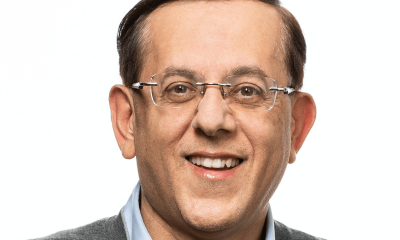Technology
Congress grills Twitter CEO Jack Dorsey over anti-conservative bias claims


Twitter
CEO Jack Dorsey
Drew Angerer/Getty
Images
-
Twitter CEO Jack Dorsey testified before Congress on
Tuesday over election interference and allegations of
anti-conservative bias. -
The tech executive has insisted his company is not
deliberately discriminating against right-wingers. -
The claims have become a hot topic in conservative
circles in recent weeks, and Trump has accused social media
firms, without evidence, of interfering in the 2016
election.
It was Twitter CEO Jack Dorsey’s turn to sit in the political hot
seat on Wednesday, as he was forced to defend Twitter from
allegations of bias from Republicans even as Democrats decried
the hearing as a baseless and politicized farce.
The New York-based exec appeared before two, back-to-back
congressional hearings — one hosted by the Senate intelligence
committee, and another by the House energy and commerce
committee.
The questions from senators, which Dorsey appeared before
alongside Facebook COO Sheryl Sandberg in the morning, focused
largely on election interference and malicious activity from
foreign actors. The afternoon House hearing, by contrast, focused
squarely on alleged anti-conservative social media bias — an
allegation that has been repeatedly pushed by Republicans in
recent months, including president Trump.
The 41-year-old tech figure repeatedly denied any intentional
bias from Twitter in a monotone voice — while Democrats attacked
Republicans’ allegations in far more strident
terms. Democratic Pennsylvania Congressman Mike Doyle was
blunt: “It’s a load of crap.”
Google was conspicuous by its absence
The hearings come after a bruising few years for social media
firms — especially Facebook — that have shaken much of the
optimism and goodwill the industry once held.
Russian operatives were able to game Facebook and Twitter to
spread propaganda in the run-up to the 2016 US election, and
since then there has been one scandal after another, from
Cambridge Analytica to the role of Facebook in spreading hate
speech in Myanmar amid ethnic cleansing.
Read
more:
The Senate is tearing into Google for refusing to send a top exec
to testify — and even left an empty chair and name tag to
highlight its displeasure
Congressman shuts down far-right protester during Twitter CEO
Jack Dorsey’s testimony by speaking like an auctioneer
Jeff Sessions is summoning state AGs to discuss whether tech
companies are ‘intentionally stifling’ free speech
The Senate hearing was the fourth in a series of public hearings
convened to discuss this subject. Mark Zuckerberg, Facebook’s
cofounder and CEO, had been hauled in front of lawmakers earlier
in the year to answer their questions.
Some of the harshest rhetoric during the hearings was reserved
for Google — which opted not to heed the committee’s request and
make CEO Sundar Pichai available (The committee could have
subpoenaed Pichai, forcing his attendance, but opted not to.)
The search giant was represented at the table by a symbolic empty
chair and name-tag, and senators lined up to throw jabs at
it.
“Given its size and influence, I would have thought the
leadership at Google would want to demonstrate how seriously it
takes these challenges and to lead this important public
discussion,” ranking Democratic senator Mark Warner
remarked.
 Drew Angerer/Getty Images
Drew Angerer/Getty Images
Beyond digs at Google, the tougher criticism at the hearing
was targeted at Twitter. Susan Collins, a Republican senator for
Maine, attacked Twitter for failing to notify users adequately
about Russian bots, prompting Dorsey to concede that “we simply
haven’t done enough” and that the status quo is
“unacceptable.”
Florida’s Marco Rubio also attacked Twitter over its
willingness to censor content on geographic grounds in certain
countries, while Arkansas’ Tom Cotton was critical of Twitter’s
decision to refuse to let the CIA access its enterprise data
product Dataminr.
Politicians are bitterly divided over the issue of social
media bias
The second hearing of the day focused on alleged social
media bias, and Dorsey’s message was essentially simple: Twitter
isn’t biased.

Donald Trump.
Chip
Somodevilla/Getty Images
The company has made mistakes in the past, he said — including a
filter that reduced the spread of 600,000 accounts that some of
the right perceived to be unfairly targeted towards conservatives
— but these have been corrected. There’s more work still to be
done, the exec said, but there are no intentional attempts to
silence conservative voices on the platform.
Republicans were clearly skeptical of this argument.
Dorsey
faced multiple allegations of bias
against conservatives, with lawmakers alternately asking about
the verification process (broken, he admitted), the motivations
of the developers writing Twitter’s algorithms, search results,
and recommended accounts to follow.
Democrats, meanwhile, rubbished the entire event, with New
Jersey’s Frank Pallone labelling it “one more mechanism to raise
money and generate outrage.” Colorado’s Diana DeGette called it a
“borderline conspiracy theory,” and
Maryland’s
Paul Sarbanes suggested the
complaints of “non-existent bias” were intended to actually push
social media platforms towards unfairly promoting conservatives
over liberals.
“It’s a shame, frankly, that this committee has been drawn into
such a charade,” he said.
Republicans are doubling down
Dorsey’s denials — and the Democrats’ outrage — seems unlikely to
dissuade right-wingers from this line of argument, and some
Republicans are leaning heavily into it as a tool to stoke the
party’s base.
In an interview published in right-wing news site The Daily
Caller on Wednesday, President Trump accused tech firms of
“interference” in the 2016 presidential election without
evidence.
And as the Senate hearing concluded,
the US Department of Justice announced that attorney general Jeff
Sessions is convening a meeting of some state attorneys
general to discuss whether tech firms are “intentionally
stifling” freedom of speech and obstructing competition.
-

 Entertainment6 days ago
Entertainment6 days agoSummer Movie Preview: From ‘Alien’ and ‘Furiosa’ to ‘Deadpool and Wolverine’
-

 Business7 days ago
Business7 days agoPetlibro’s new smart refrigerated wet food feeder is what your cat deserves
-

 Entertainment5 days ago
Entertainment5 days agoWhat’s on the far side of the moon? Not darkness.
-

 Business6 days ago
Business6 days agoThoma Bravo to take UK cybersecurity company Darktrace private in $5B deal
-

 Business5 days ago
Business5 days agoHow Rubrik’s IPO paid off big for Greylock VC Asheem Chandna
-

 Business5 days ago
Business5 days agoTikTok faces a ban in the US, Tesla profits drop and healthcare data leaks
-

 Business4 days ago
Business4 days agoLondon’s first defense tech hackathon brings Ukraine war closer to the city’s startups
-

 Business6 days ago
Business6 days agoZomato’s quick commerce unit Blinkit eclipses core food business in value, says Goldman Sachs






















